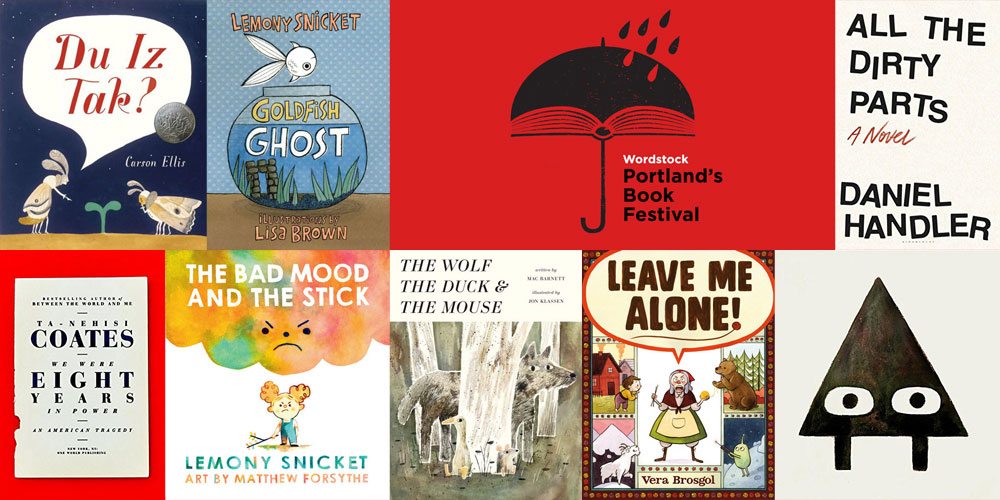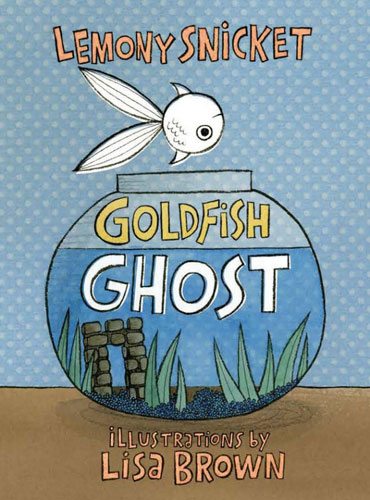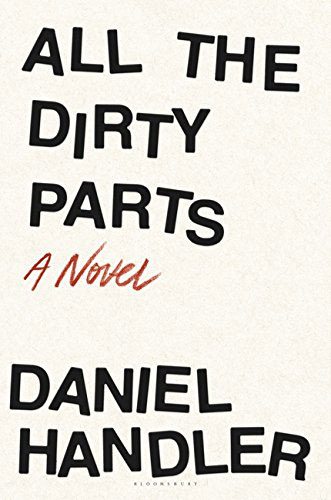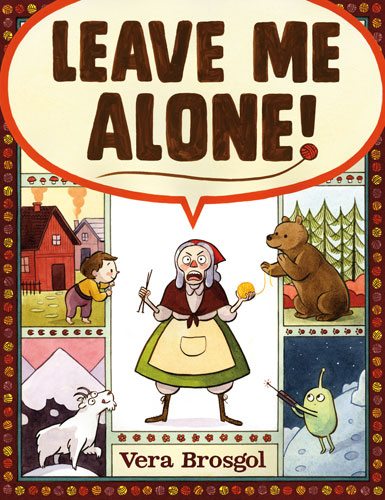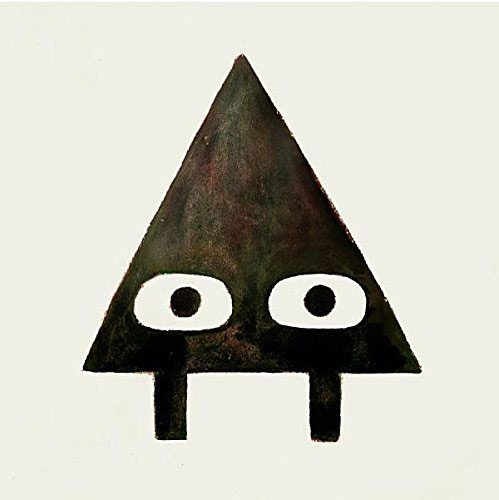This past weekend, I attended Wordstock, a book festival in Portland, Oregon, hosted by Literary Arts. It’s a festival that has changed significantly in form over the past several years, but remains a celebration of books and writing and reading. I wasn’t able to attend many events this year, but I did have a great time and heard some fantastic interviews. So today’s Stack Overflow is a slightly different format—it’s more about the writers I heard from, but I’ll also share some of the books that they’ve written.

Daniel Handler/Lemony Snicket
The first event I went to after picking up my media badge was an interview with Daniel Handler, aka Lemony Snicket, at the Arlene Schnitzer Concert Hall. He’s the author of many books, including A Series of Unfortunate Events, and has also written picture books, books for adults and young adults, and even a play. The interview was conducted by Gilbert Cruz, the television editor at the New York Times.
If you’ve ever read any of the Lemony Snicket books, then you’ll have a pretty good sense of what Daniel Handler is like in person. He has a dry, somewhat morbid sense of humor and a deep love for reading and books, and he’s very odd. The interview was a lot of fun to listen to.
A few of his latest books as Lemony Snicket are The Bad Mood and the Stick, illustrated by Matthew Forsythe, and Goldfish Ghost, illustrated by Lisa Brown (who happens to be Handler’s wife). He was describing how he wrote Goldfish Ghost while sitting with Brown on the coast, looking out at the water, while she drew little pictures of a dead goldfish. Because Handler and Brown are the sort of couple, it seems, who enjoy having a quiet night sitting together and contemplating death. Cruz asked him about whether he has a different approach to writing a book for young children or young adults or adults, and Handler replied that he didn’t really think in those terms. “Nobody writes a book for a 41-year-old man. Why should we write a book for a 3-year-old?” He thinks more in terms of format—this idea seems like a picture book; this idea would work as a series. He said that Goldfish Ghost was a picture book because he couldn’t imagine a dead goldfish having adventures for an entire series of books … “Well, actually, now I’m imagining it.”
At one point Handler also described his writing process. He carries around a little notebook (“This is what a notebook looks like, for those of you who haven’t seen one”) and jots down thoughts and ideas and things he overhears. When it’s full, he types it all up on the computer. Then he prints it out, and then (“I know this is going to make me sound like a crazy person”) he cuts them out and puts them on index cards, and then rearranges those into different orders, and then when he’s happy with it he takes those index cards and then types those into the computer. He mentioned a book of poetry entitled Sorry, Tree by Eileen Myles, and said that he thought maybe every book of his should be entitled Sorry, Tree.
The Bad Mood and the Stick involves, well, a bad mood and a stick. The bad mood starts with a girl named Curly, who’s upset that she didn’t get ice cream, and the stick starts on the ground, where a tree had dropped it. Throughout the book, both the bad mood and the stick end up going to different places and doing different things. The bad mood looks like a little unhappy cloud, and jumps from person to person (to animal) over the course of the book—and you never know how things are going to turn out. I should note that there has been some controversy over this book, since the cover originally depicted the bad mood as a dark cloud that many readers felt looked a lot like racist caricatures, so it was changed. The story itself also has a plot point about a guy getting his muddy overalls cleaned at a dry cleaner’s and standing around in his underwear—something that is meant to look silly but is problematic and may seem inappropriate. I do think there’s a good message in there about how bad moods can be contagious but that they don’t have to be, and I can also see why that scene could be offensive, so I think it’s worth previewing before you read it to your kids, and be ready to talk about it.
Handler’s latest book (as Daniel Handler) is All the Dirty Parts, about a high school boy named Cole and, well, sex. Handler made a remark during the interview that we as a society have often decided that teenagers shouldn’t be reading about sex. Almost all of the books that were on the top 10 banned books this year were there for sexual content—often having to do with LGBT characters, but sometimes just for sexually explicit scenes. Instead, Handler noted, what we feel young adults should read, according to the books we encourage, is about teenagers murdering each other in a dystopian world—think about what that says about our priorities. Handler is often asked to speak on the topic of how to get boys to read (“which is somewhat ridiculous, as I was the sort of boy who always wanted to read, so what do I know about that?”) and said that, well, a lot of teenage boys are interested in sex, but then nobody allows them to read about it. I haven’t read All the Dirty Parts myself, but I suppose if you’re looking for a book with sex in it, you know what to expect from the title.

Book Fairs
After Handler’s talk, I walked over to the Portland Art Museum. Unfortunately, I was too late for a panel on picture books—it was in a smaller room and it had filled up to capacity very early. So instead, I checked out the book fair areas. There were two of them, both set up in ballrooms, with various publishers, writing groups, colleges, and editing services showing off books and services. I didn’t spend as much time as I’d like to because I wanted to get back to the next event, but I love browsing books and so it was fun to see the variety of books on offer here. In particular, there were a lot of smaller independent publishers, with titles that I wouldn’t normally see around as often.

Food Trucks
The Park Blocks near the museum were closed off to vehicle traffic during the day, and there were various food trucks (we call them “food carts” here in Portland) available for sustenance. On the way to the next event, I chose the shortest line and got a bowl from On Tots, which serves tater tots covered in various things. Yum!
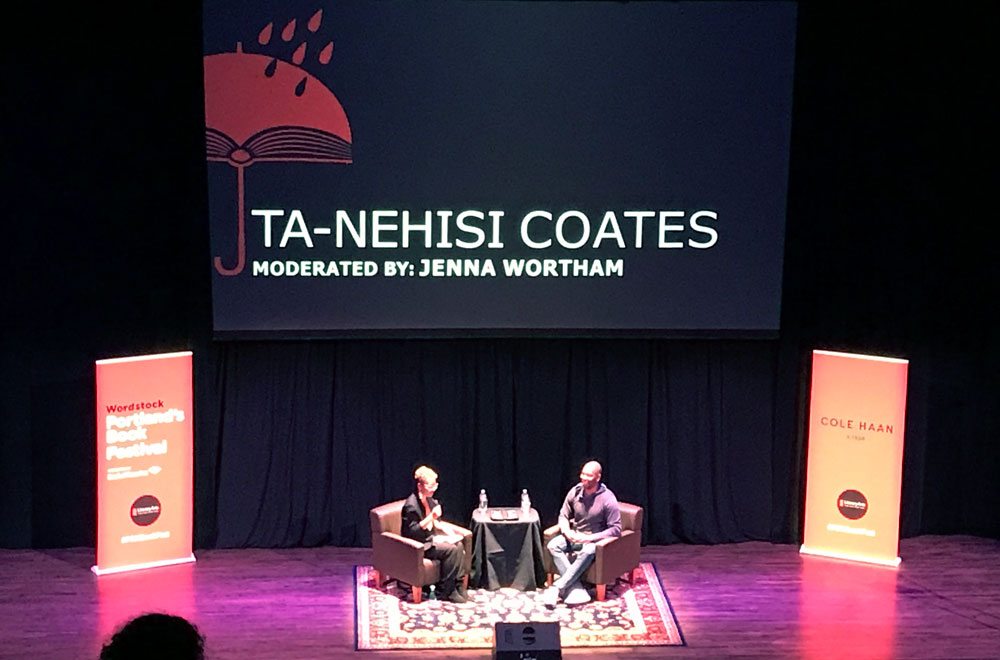
Ta-Nehisi Coates
There was a long line to get into the Schnitzer Concert Hall for the interview with Ta-Nehisi Coates—they delayed the start of the program so that they could fill all the seats, and I’m guessing there were people who were turned away after the hall was full. Coates is the author of Between the World and Me, a letter to his son about being a black man in America. (I read it earlier this year—my reaction is in this Stack Overflow column.)
Since the book’s publication two years ago, Coates’ life has changed drastically. In the interview, conducted by Jenna Wortham (a tech reporter for the New York Times Magazine and co-host of the Still Processing podcast), Coates said that prior to 2015, he primarily thought of himself as a writer: he would find a subject he was interested in, research it, and write about it. Between the World and Me brought him a lot of fame and attention—so now he feels that he’s expected to have an opinion on every subject: race, global warming, feminism, you name it. He says that we don’t think of somebody being smart about one thing; we expect them to be smart about everything, and he wasn’t really prepared for that. He feels that even when it comes to the issue of racism, his expertise and knowledge is a “narrow lane” within that subject, so he tries to be honest about that.
He made a reference to other celebrities that he used to scoff at—for instance, Kanye West—because their lives seemed out of control, and he wanted to know why somebody who was intelligent and had talent couldn’t get it together. But now, he said, he experienced a tiny, tin fraction of what Kanye probably does, and he was coming into it with a stable family structure and support system, and it was almost too much. So he had a new appreciation for the pressures of fame.
His latest book is We Were 8 Years in Power: An American Tragedy, a collection of new and previously published essays. Many of these are collected from his work at The Atlantic, and Coates revisits the Obama administration as well as his own writings.
The title itself, which many assume is referring to the Obama administration, is actually a quote from a black senator after Reconstruction. Coates told the story about how there were blacks who literally went from being slaves to being senators during Reconstruction, and were expected to govern—and they actually did well. By eight years later, there was a concerted effort to disenfranchise black voters in various states, and black politicians were removed from power. One lamented that in their eight years in power, they did well—why would the whites take that away? Didn’t they acquit themselves in a respectable manner?
What he didn’t understand, Coates says, is that “the one thing that frightened them more than bad Negro government was good Negro government.” The idea is that if the blacks made a mess of things, that would have confirmed their beliefs about the inferiority of blacks and their inability to govern. But if the blacks proved themselves capable, then that was a danger to the whites’ deeply held views, and they couldn’t let that stand. Of course, the title is also meant to make you think about the Obama years, and Coates draws a parallel between the post-Reconstruction reaction to blacks in power and the current reaction to Obama’s administration. I haven’t read We Were 8 Years in Power but I have added it to my list—since I’m late to reading Coates’ writing, all of the articles will be new to me.
Coates is also, of course, writing the current Black Panther series. I’ve only read a little of it so far, but with the upcoming movie, I imagine there will be increasing interest in those as well. When Wortham asked what he was working on next—always a tough question for somebody who has just published something, I think—at first Coates hemmed and hawed, and finally said that probably the immediate next thing was more scripts for Black Panther. But then he said that he’s working on another comic as well, something surprising: “I want to be on Twitter the day this is announced, just to watch people’s reactions.” So … stay tuned for that!

Carson Ellis
I went back over to the Portland Art Museum and, after waiting in line for a while, finally made it into the room for the kids’ stage, where Carson Ellis was reading from her book Du Iz Tak? Ellis is the illustrator of the Wildwood series (written by Decemberists frontman and Ellis’s husband Colin Meloy), as well as Home, a picture book about homes (covered in this Stack Overflow). 
Du Iz Tak? is a delightful book about some tiny creatures (moths, beetles, and so forth) who discover a small green shoot and then watch it grow as the seasons change. The book is filled with a made-up language, but as you read the book, you can try to piece together what the words mean and what the characters are saying. It’s a fun exploration of growth and seasons changing (as well as some of the dangers of nature), but also a fascinating experiment with language and communication.
Ellis also read her book Home, which describes different homes that people may live in, both real and fictional, and as she read she described bits of her process or some of the fun details that she had hidden in the book, like herself as a child on the page about the old woman who lived in a shoe.
Finally, at the end of her readings, she took questions from the audience. One of my favorites: “Why haven’t you written any books about dinosaurs?” To which she replied: “Well, that’s a good question.”
Vera Brosgol
I got to chat briefly with Vera Brosgol, who was in the back of the kids’ stage room waiting for her time slot. She was reading from her book Leave Me Alone!, which I included in this Stack Overflow. An old woman is trying to knit some sweaters, but she keeps getting pestered no matter where she goes—by kids, bears, goats … and little green aliens. She finally does find a suitable spot and gets some time to herself and gets some knitting done: but where is a surprise.
Brosgol said that she has a couple books she’s working on—another picture book (by a different author) and a comic book memoir for First Second that will be coming sometime next year. I’m looking forward to it!

Mac Barnett
I first wrote about Mac Barnett back in 2010, when I reviewed The Brixton Brothers: The Case of the Case of Mistaken Identity. It was a send-up of the old kid detective trope, parodying and playing homage to series like Encyclopedia Brown and Hardy Boys, and I loved it. After that, I started watching for Barnett’s books—the rest of the Brixton Brothers series, but also a lot of picture books, many of which have been covered here on GeekDad in the years since. I even convinced Barnett to take part in my crazy Kickstarter project several years ago: he’s the guy who pretends to be a doctor.
Up until this weekend, though, we’d never actually met in person. So it was a huge treat to get a chance to hang out with Mac. I waited until he was done signing autographs after his reading (he had a long line!) and fortunately he had a bit of time between that and his next engagement, so we went to a nearby coffee shop and chatted.
I did ask him about the Brixton Brothers series, which my kids also have really enjoyed; there were four books in the series, and I wondered if there were plans to write any more. Barnett said that he had some ideas for a fifth book, but he also wasn’t sure whether it made sense to pick up the series again now that it’s been eight years since the initial book—the audience that was the target age when it was published is now quite a bit older. On the other hand, there are many book series that are like that—by the time the latest volumes are published, a new audience may just be discovering the earlier ones. As far as I know, the Harry Potter series is one of the few in which the last book of the series is written for a significantly older audience than the first book. At any rate, if any more Brixton Brothers novels come along, I’ll definitely be in line to read them!
One of his recent picture books, published in March this past year, is Triangle, illustrated by Jon Klassen. It’s the first in a planned trilogy about shapes. Triangle decides to play a “sneaky trick” on his friend Square, traveling past all the triangle mountains and then the landscapes made of shapes with no names, until he reaches a region filled with big square blocks, where Square lives. It’s a fairly silly trick, and then an even funnier response. Jon Klassen’s art is great, as always: the shapes are just simple shapes with eyes and tiny legs. I love how the shapes can only emote with their eyes, but in combination with the words, you can “see” their emotions thanks to the subtle changes in the shapes of the eyes. The next book, Square, is expected next May.
Barnett’s latest book is The Wolf, the Duck, and the Mouse, also illustrated by Jon Klassen. A mouse is gobbled up by a hungry wolf one day and discovers, to his surprise, that there is a duck already living in the wolf’s stomach. The duck is pretty pleased—there’s plenty to eat, thanks to the wolf’s voracious appetite, and there’s no more fear of getting eaten by a wolf … if you’ve already been eaten by a wolf. The mouse and duck are able to enjoy a pretty nice life in the belly of the beast, until their home is threatened by a hunter. It’s a delightfully silly book and I’m not sure there’s particularly a moral to the story, but if you and your kids enjoy absurd humor, this is the book for you.
So, that was my Wordstock experience! There were so many other events that I saw listed and wished I could attend, darn my corporeal limitations. Fortunately, many of the talks are recorded and will be available through the Archive Project, where you can also listen to interviews and panels from previous Wordstock festivals. Thanks to Alyson Sinclair (whom I also finally met in person this weekend) for providing a media badge, and to all the people who made Wordstock possible!
Disclosure: I have received review copies of The Bad Mood and the Stick, Du Iz Tak?, Leave Me Alone!, and Triangle.
